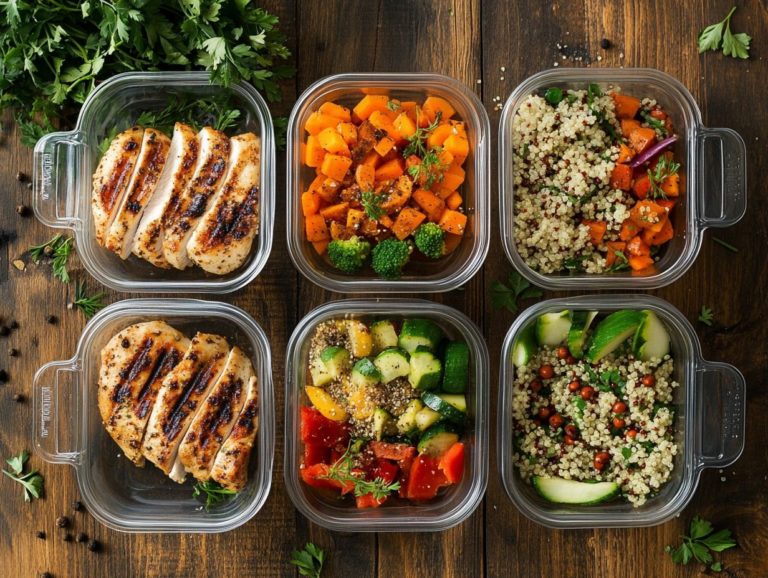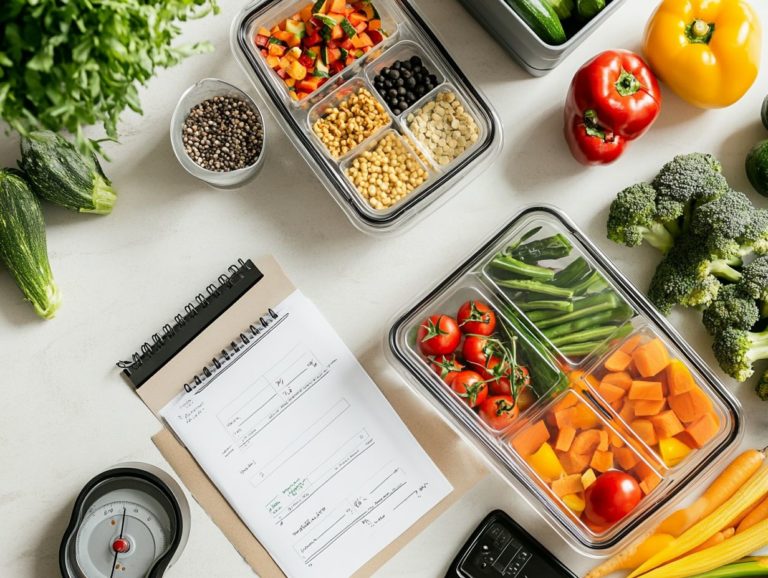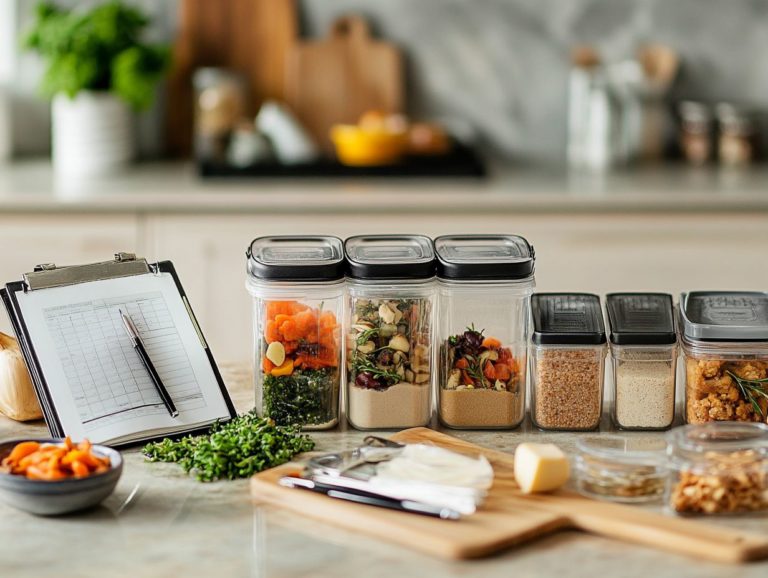The Role of Meal Planning in Healthy Eating
Meal planning transcends mere meal organization; it serves as a pivotal strategy for developing healthier eating habits and achieving a balanced lifestyle.
By grasping the fundamentals of meal planning, you can unlock a wealth of benefits, including time and money savings, along with enhanced nutrition.
This guide will show you how easy and fun meal planning can be!
Explore how meal planning can revolutionize your relationship with food and fitness!
Contents
Key Takeaways:
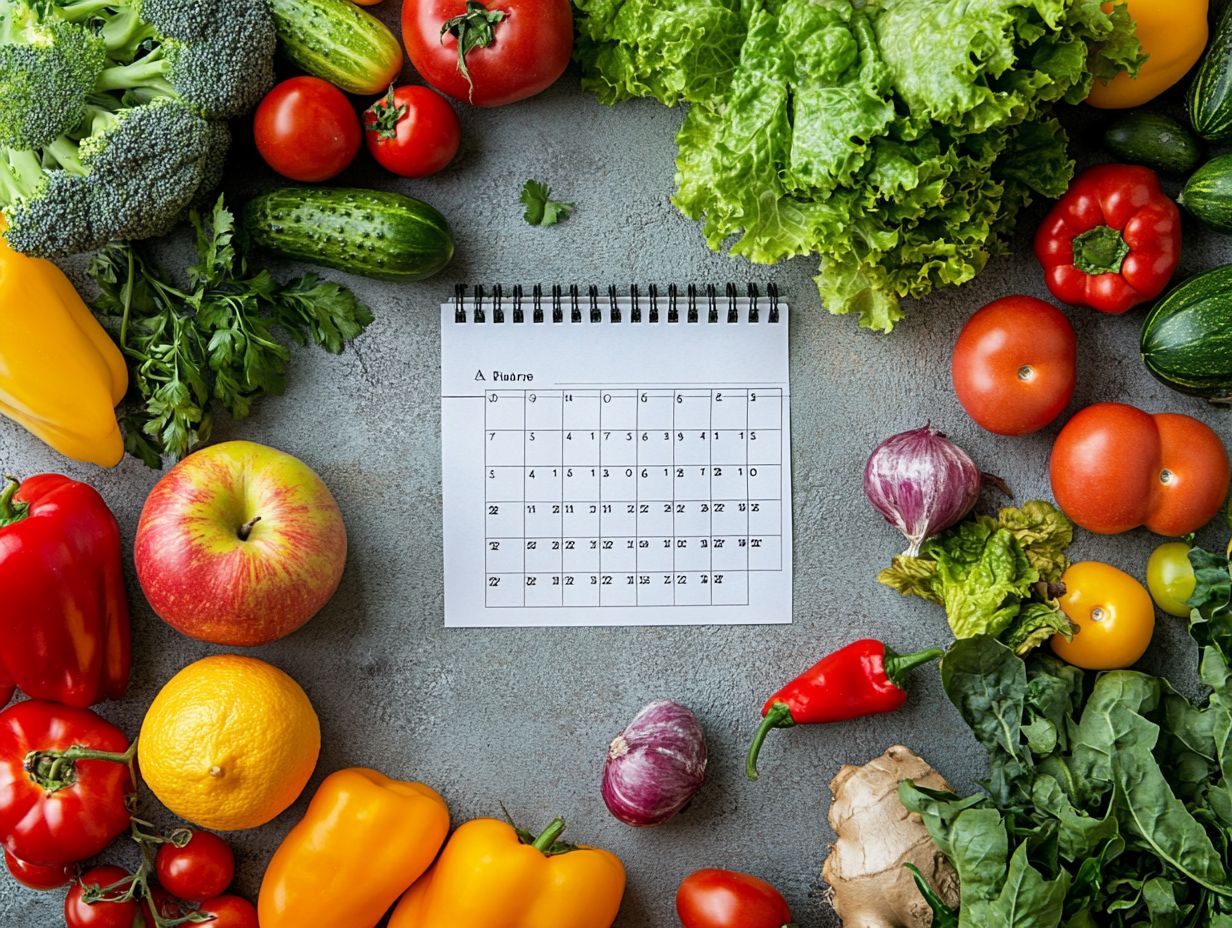
Meal planning means preparing and organizing your meals for the week. It involves creating a detailed plan for each meal, including ingredients and cooking instructions.
Meal planning can save time and money by reducing food waste and minimizing the need for last-minute takeout or grocery store trips. It also supports a healthy diet by allowing for intentional and balanced food choices.
To create a successful meal plan, follow a step-by-step guide and consider incorporating tips such as organization and flexibility.
Incorporating meal planning into a healthy lifestyle can have long-term benefits and is best paired with regular exercise.
Understanding Meal Planning
Understanding the science behind meal planning for nutrition is essential for anyone aiming to elevate their healthy eating habits, particularly in today’s fast-paced environment.
With busy schedules often pushing you toward fast food, it can compromise your balanced diet. By adopting a structured approach to meals, you can effectively manage your food preferences and adhere to dietary guidelines.
This makes it simpler to savor family meals that align with your health goals, turning nourishment into a delightful experience.
What is Meal Planning?
Meal planning is your chance to take charge of your meals, allowing you to organize them in advance. This typically involves crafting a grocery list and selecting recipes that suit your personal tastes and dietary requirements.
This thoughtful approach gives you the power to manage your nutrition effectively while saving precious time during a busy week.
Choose recipes that match your tastes and dietary needs to ensure a balanced diet while accommodating restrictions like gluten-free or vegan preferences.
The next step in your meal planning journey is to create a detailed grocery list, which streamlines your shopping experience and reduces food waste.
Whether you enjoy baking, saut ing, or slow-cooking, these methods align seamlessly with your meal prep goals, giving you more time in the evenings for family bonding or relaxation, all while ensuring that delicious, nutritious meals are always at your fingertips.
Benefits of Meal Planning
The advantages of meal planning are extensive, offering remarkable enhancements in time management and food organization.
This practice also reduces stress, making it an invaluable strategy for anyone striving to uphold a healthy diet in the midst of a hectic lifestyle.
Time and Money Savings
Meal planning offers you significant time and money savings, allowing you to budget your food expenditures more efficiently and cut down on unnecessary grocery store trips.
This strategic approach simplifies your shopping experience and encourages thoughtful purchasing decisions.
By dedicating a day for meal prep, you can create a well-organized grocery list that highlights seasonal produce, bulk items, and sales, ultimately minimizing impulse buys.
This systematic method also helps you keep track of pantry staples, ensuring that everything from grains to proteins is utilized effectively.
As a result, those who embrace meal planning often discover their monthly expenses decrease dramatically, transforming their approach to both cooking and budgeting.
Start your meal planning journey today and watch how it transforms your cooking and eating habits!
Health and Nutrition Benefits
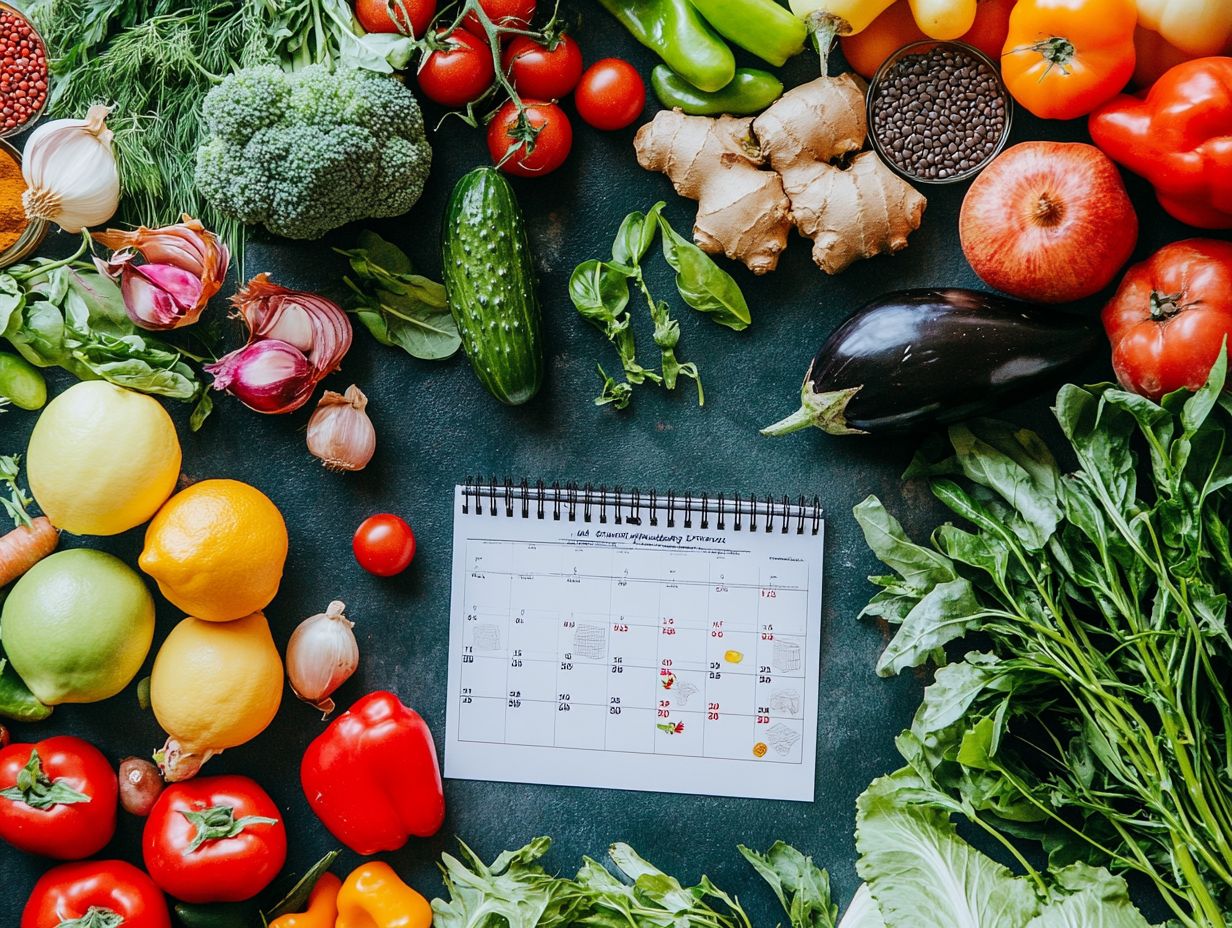
Engaging in meal planning offers profound health and nutrition benefits. It allows you to create meals that perfectly align with your dietary needs and significantly reduces the risk of health issues like heart disease and diabetes.
By dedicating time to plan your meals in advance, you can ensure a balanced intake of essential nutrients, which is vital for your overall well-being. This proactive strategy helps you avoid impulsive, unhealthy food choices and encourages you to include a diverse array of fruits, vegetables, whole grains, and lean proteins in your diet.
By adhering to established nutritional guidelines through meal planning, you can effectively manage your caloric intake the number of calories you consume and find it easier to control conditions such as hypertension or obesity. This method helps you develop sustainable eating habits that lead to long-term health benefits and a more vibrant lifestyle.
How to Create a Meal Plan
Ready to transform your meals? Let s dive into creating an effective meal plan!
Start with a comprehensive meal planning guide that includes a grocery list to make shopping easier and helps you manage portion sizes.
Explore various recipe sites to inspire your culinary creativity and ensure your meals are both diverse and enjoyable.
Step-by-Step Guide
Start your meal planning with a dedicated prep day. Use this time to try efficient cooking techniques and store food in high-quality containers.
This focused time allows you to thoughtfully select recipes that align with your dietary preferences and nutritional goals. Explore different cooking methods such as roasting, steaming, and saut ing to create a range of meals that cater to various tastes.
Once you ve gathered your ingredients and prepared the meals, using airtight containers becomes essential. This preserves freshness and flavor while making reheating a breeze throughout the week.
Embracing this organized approach promotes healthier eating habits and streamlines your daily routine, ultimately saving you time and reducing stress.
Tips for Successful Meal Planning
Successful meal planning relies on your ability to stay organized and a genuine desire to refine your cooking skills.
By exploring a diverse range of meal ideas, you can cater to both your personal tastes and the needs of your family.
Organization and Preparation
Effective organization and preparation are essential components of your meal planning journey. Begin with a meticulously crafted grocery list and designate a meal prep day that suits your cooking skills.
Chart out your meals for the week ahead to ensure you have all necessary ingredients. This minimizes stress and the temptation to make impulsive purchases.
It s advantageous to categorize your grocery list into sections think produce, protein, and pantry staples. This makes your shopping excursion efficient and almost enjoyable.
Allocating a specific day for meal prep opens the door to batch cooking, allowing you to prepare larger quantities that can be stored for future meals, streamlining your week.
Embracing the practice of freezing portions enhances variety while reducing food waste, giving your personalized meal planning a substantial boost in flavor and efficiency.
Variety and Flexibility
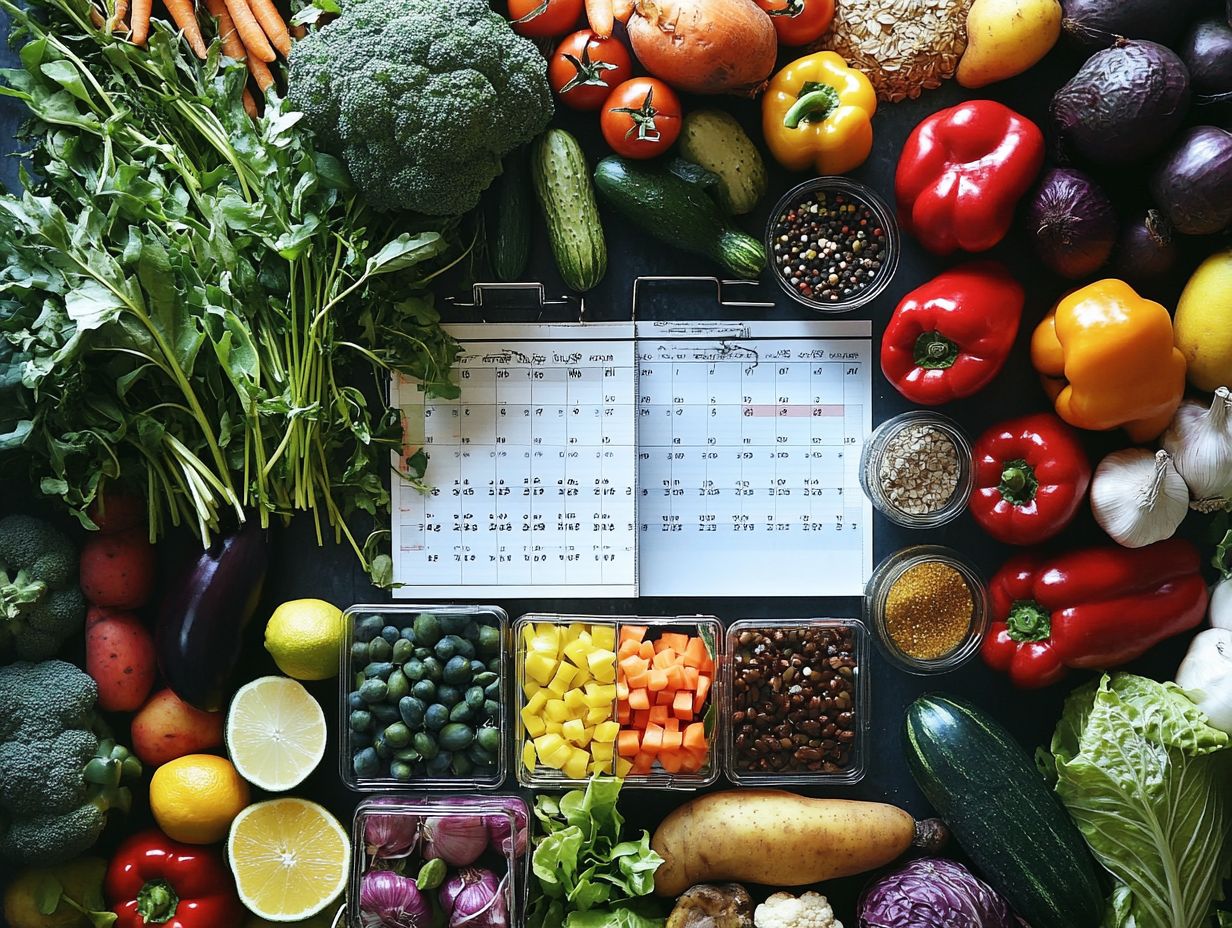
Incorporating variety and flexibility into your meal planning is essential for keeping your interest alive in healthy recipes. This approach allows you to adjust based on your ever-changing food preferences or occasional cravings for comfort food.
This method keeps meals exciting and caters to a wide range of palates by introducing an array of flavors and textures.
One effective trick is to establish themed nights, like Taco Tuesdays or Stir-Fry Fridays. Maintain the same base ingredients but elevate them with different seasonings or toppings. By experimenting with seasonal produce, you enhance your meals while supporting local farmers.
Drawing inspiration from global cuisines ensures that every family member discovers something to savor, whether it’s creamy mac and cheese or zesty Mediterranean dishes, creating a delightful cooking experience that everyone can enjoy.
Start planning today for a healthier tomorrow!
Incorporating Meal Planning into a Healthy Lifestyle
Incorporating meal planning into your healthy lifestyle offers a wealth of benefits. It enhances your meal prep strategies and supports your nutritional goals.
By combining meal planning with your exercise routines, you can elevate your overall well-being.
Long-Term Benefits and Sustainability
The long-term benefits of meal planning go far beyond saving a few bucks; it cultivates sustainable eating habits that enhance your nutrition and overall health.
When you dedicate time to plan your meals in advance, you gain control over your dietary choices and minimize food waste.
This proactive approach encourages you to include whole foods and seasonal ingredients while fostering mindful eating practices.
Meal planning helps you stay consistent with your healthy choices, establishing habits that can be maintained over time.
It gives you the power to make informed decisions, ultimately leading to improved energy levels, effective weight management, and a deeper appreciation for your food.
Combining Meal Planning with Exercise
Combining meal planning with a regular exercise routine amplifies health benefits. Proper nutrition is essential for optimal performance and recovery.
A well-structured meal plan not only provides essential nutrients to fuel your workouts but also plays a vital role in muscle repair and growth.
By carefully selecting nutrients like carbs for energy and proteins for muscle recovery, you can elevate your athletic performance.
Meal planning helps you control your caloric intake, maintaining or achieving your desired body weight while keeping your energy levels stable.
Incorporating a colorful variety of vegetables, fruits, lean proteins, and healthy fats into your meals supports your overall health and helps you stay committed to your fitness goals.
Frequently Asked Questions
What is the role of meal planning in healthy eating?

Meal planning is organizing and preparing meals ahead of time. It s a game-changer for healthy eating by promoting balanced and nutritious meals that meet daily nutrient requirements.
Additionally, it reduces the temptation of unhealthy food choices and prevents impulsive eating habits.
How does meal planning contribute to a healthier lifestyle?
Incorporating meal planning into your routine ensures you eat a variety of nutritious foods throughout the day. This can improve your overall health by providing your body with necessary nutrients.
Meal planning also allows for portion control and helps manage weight, preventing chronic diseases.
What are the benefits of meal planning?
Meal planning has numerous benefits. It saves time and money, reduces food waste, and promotes better eating habits.
Moreover, it allows for a more organized grocery shopping experience.
How can meal planning help with weight management?
Meal planning helps you control your food choices and portions, essential for weight management. By preparing meals ahead of time, you can avoid impulsive eating habits.
This focus on consuming nutritious and balanced meals can help prevent overeating and promote mindful eating.
Do I have to plan every meal to eat healthily?
No, you don t have to plan every single meal. However, it’s recommended to plan a few meals each week to ensure a balanced and varied diet.
This also makes grocery shopping and meal prep easier, helping you eat healthily throughout the week.
How often should I update my meal plan?
It s recommended to update your meal plan at least once a week. This allows for flexibility in case you need to make changes, such as adding fresh produce or accommodating last-minute events.
Some may prefer to plan for longer periods, like two weeks or a month, depending on their personal schedules.
Ready to take control of your health? Start meal planning today!



